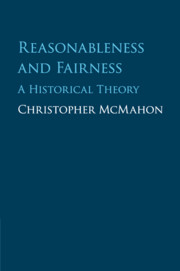2 - Reasonableness
from Part I - The Substance of Reciprocal Concern
Published online by Cambridge University Press: 24 November 2016
Summary
In this chapter, I begin the discussion of the second of the two concepts of the morality of reciprocal concern investigated in this book: reasonableness in the concession sense. I have suggested that reasonableness in this sense is grounded in the same motivational disposition that grounds fairness, the disposition to respond to perceived disparities of concession by making or seeking corrective concessions. If that is right, reasonableness in this sense can be understood as a moral notion of a kind. When the motivational disposition is functioning properly, it will usually displace competing motivation, although unreasonableness may not always be connected in the same way as unfairness with guilt and indignation.
Reasonableness takes another form, however, reasonableness in the competence sense. This is the form of reasonableness at issue when, for example, a conclusion is described as reasonable. The two forms of reasonableness are related in various ways, and one of the goals of this chapter is to explore these interrelations, but I begin with separate accounts of each. The chapter concludes with two sections that explore how certain features of the moral theories of John Rawls and T. M. Scanlon, both of which give a central place to the concept of the reasonable, look from the standpoint of the distinction I make between the two forms of reasonableness.
The Competence Sense
For the purposes of our investigation of the connection between reasonableness and fairness, reasonableness in the concession sense is the most important form of reasonableness to consider. We speak of people as reasonable in the concession sense, and we speak of cognitive products, such as plans or cooperative schemes, as reasonable in this sense. But we also use the term “reasonable” simply to mark competent reasoning. Thus a reasonable conclusion is a conclusion that, in the context, can be supported by competent reasoning.
The earlier discussion made use of the concept of proper functioning, and we can understand the competence of a reasoner in these terms. A person is reasoning competently in a particular case when his drawing of a conclusion, or generating a cognitive product of some other kind, manifests the proper functioning of the relevant mental capacities. Similarly, the general competence of a person as a reasoner is a matter of his generally proceeding in a way that manifests the proper functioning of the relevant capacities.
- Type
- Chapter
- Information
- Reasonableness and FairnessA Historical Theory, pp. 61 - 100Publisher: Cambridge University PressPrint publication year: 2016

